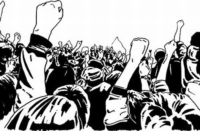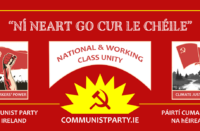For months the media have been full of stories about the cost-of-living crisis, the climate crisis, the housing crisis, and the crisis in the health service. The Government has laid the blame on the world economy, or on supply-line issues, either as a result of the pandemic or of the war in Ukraine (take your pick). They have blamed the public for using too much electricity, too much water, too much petrol. The opposition parties blame the Government.
The prevailing consensus, articulated by the political establishment, is that such crises, while regrettable, are perfectly normal. Best hunker down, buy candles in case of power cuts, and hope for the best. The media act as an echo chamber, and there is a constant loop of analysis and solutions to the various crises without ever mentioning the real cause: capitalism!
We are living through a crisis of capitalism, for which it, and its government, will try to force the working class to pay. Capitalism by its very nature seeks to increase its profitability: that is its raison d’être. It is not an issue of good or bad capitalists: the drive to increase profits will lead them to try to force down wages, increase rents, use more and more non-renewable resources. The drive to increase profits forces capitalism to risk exterminating all life on the planet.
Working-class communities throughout the country are beginning to organise to resist further attacks on their standard of living. Under pressure from the rank and file, trade unions have begun to ballot their members for industrial action, with the example of the British transport workers demonstrating the strength of organised labour. Already the Government is sounding out the ICTU to see if they can forestall any militancy by tying the trade unions into a below-inflation pay deal.
Coalitions are being formed to protest against increases in the cost of living and to demand action by the Government. Tenants are beginning to organise against exorbitant rents, and the CPI’s demand for public housing for all as the only solution to the housing crisis is gaining more and more support. Opposition to plans for more data centres—heavy users of electricity and water (see Socialist Voice, August 2022)—is growing.
These campaigns deal with specific issues; and were they to achieve their aims they would bring real benefits to working-class communities. They demonstrate that only by being organised as a class can the working class make advances or defend their communities.
However, even if workers get pay increases in excess of inflation, even if rents are reduced, and public housing becomes the norm, unless capitalism is overthrown and replaced by socialism all those gains are at risk of being reversed.
After the Second World War the creation of the National Health Service was one of the greatest achievements of the British labour movement; but, because Britain remained a capitalist country, the NHS has been under attack almost since its inception—and, as those in the Six Counties can attest, it is now but a pale shadow of what it was.
Compare this with Cuba, which is a much poorer country than Britain but has a health service that is the envy of the world and, despite the illegal US embargo, was still able to send medical teams to many countries—including EU countries—to help combat covid-19. Cuba has a socialist economy, which is geared towards the needs of society and not the quest for profit; and that one fact underpins the difference between the two health systems.
That is not to say that communists believe that these struggles are futile and destined to end in failure. These struggles are necessary to improve the living standard of the working class; in many cases they are necessary to prevent wholesale pauperisation. However, while organisation is a central element of working-class advance, of equal importance is the politics of the movement. As Marx and Engels wrote in the Communist Manifesto (1848):
“In short, the Communists everywhere support every revolutionary movement against the existing social and political order of things. In all these movements, they bring to the front, as the leading question in each, the property question, no matter what its degree of development at the time.”
This means putting forward a Marxist analysis and trying to win the majority to a socialist position. The extreme right will put forward left-sounding slogans, blaming the “elite” without ever mentioning capitalism. There is also the danger of being incorporated in the electoral system. Time and again “leftist” parties have taken over campaigns and argued that if they were elected they would take the fight to the Dáil. Any possibility of developing a radical viewpoint was then safely channelled into electoral politics.
With parliamentary elections due within the next few years, north and south of the border, the task for revolutionaries is to fight for socialist ideas and oppose the cul-de-sac of electoralism. Organisation and socialist politics are the key to resisting the capitalist offensive, which is intensifying.






